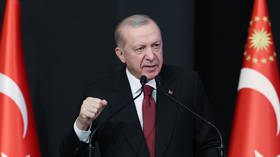
The Gamechanger: Merz Plunges Germany Into A Debt Crisis
Submitted by Thomas Kolbe
The Bundestag’s Budget Committee reached agreement on Friday regarding this year’s federal budget. In the end, record debt remains, publicly masked with accounting tricks and hopeful rhetoric. Friedrich Merz is driving Germany deeper into a debt spiral.
Political chaos in Berlin, including early elections and failed budget negotiations, delayed the adoption of the federal budget this year. On Friday, the Union parties reached agreement with the SPD in the Budget Committee on the final budget. Germany will spend €502.55 billion over the course of the year, continuing its fiscal record chase – year after year, the political circus demands ever-increasing allocations.
There is no talk of austerity or structural consolidation of state finances, despite the deep economic depression in the private sector. Still, on Friday, the term “gamechanger” circulated in coalition circles with regard to the budget.
A Budget of Superlatives
It was SPD member Torsten Rudolph who, looking at this mega-budget in the midst of the economic catastrophe, spoke of a gamechanger, echoing the enthusiasm of his colleague Christian Haase of the Union, who called the debt budget a budget of superlatives.
And in fact, they are essentially correct. If one calculates realistically and adds the debt hidden in special funds to the official debt, the total comes to €140 billion this year, equating to a net new debt of 3.3% of GDP. Germany is now violating all Maastricht criteria, quietly buried by EU central planners and statists in the eternal hunting grounds of fiscal euphemisms.
With particular pride, government officials pointed to the increase in the defense budget to €90 billion initially, set to rise to €150 billion in the coming years. Haase expressed confidence that this would send the strongest signal to opponents worldwide: Germany is making itself defensible once more. Alongside this spending euphoria comes a manic paranoia – Berlin is stirring a fiscal cauldron that threatens to boil over.
Champagne Popping in the Arms Industry
Meanwhile, the German arms industry is likely celebrating. Berlin is vigorously building a second artificial economy – alongside the already failed green planned economy. Government circles evidently believe that by propagandistically portraying Russia as a potential invader, the population has been sufficiently aligned to extract the resources necessary for building its own war economy.
That is precisely where this is heading. Every budget deficit shifts the burden to future taxpayers – returning either as inflation or higher taxes like a boomerang.
It is almost unbelievable: Germany’s defense budget last year totaled around €78 billion, about two percent of GDP.
Had it been invested strategically in cutting-edge defense technologies, it would have more than adequately supported the defense of a country surrounded exclusively by allies and friends. Yet in Brussels as well as Berlin, the prevailing belief is that the state must overcome structural weaknesses in the economy through artificially generated demand. These are well-worn Keynesian recipes – leaving nothing in their wake but rising debt and growing poverty.
Continuing the Spiral
The debt orgy is set to continue spiraling in the coming years. For 2026, Finance Minister Lars Klingbeil plans a budget of €520.5 billion – a further increase of four percent.
Meanwhile – and it bears repeating – the private sector continues to shrink, which will inevitably depress tax revenues. All financial planning in Berlin is therefore built on sand, relying on far too optimistic assumptions. Compared to what Klingbeil and the budgeters still face, the 2025 and 2026 budgets are almost a breeze.
Already, huge funding gaps are emerging: around €34 billion is missing for 2027, the ministry notes a “need for action” of €63.8 billion for 2028, and a gap of €74 billion looms for 2029.
Some of the causes are homegrown: the federal government is compensating for state tax shortfalls, expanding the mothers’ pension a year earlier than initially planned, and simultaneously repaying extensive COVID-era loans. Klingbeil stresses that no previous coalition in Germany’s history has faced a €30 billion gap. This is why the vice chancellor has already begun work on the next budget months earlier than usual.
The “Gamechanger” Is Actually an Accelerator
The gaps in social budgets will dramatically widen in the coming months and years, rooted solely in the ideological overreach of policy. The subsequent tax-raising orgy has already been prepared in the media, so the public is more or less primed for it. The state’s share of GDP, now at 50 percent, will reach French-style heights of 57 percent or more in the coming years.
Germany is thus heading inexorably toward socialism. The federal budget is therefore not a “gamechanger” – it is a fire accelerant.
Unless the bond market forces a brutal budget consolidation through dramatically rising yields in the coming years, Chancellor Friedrich Merz will go down in German history as the first post-WWII leader to plunge the country into a debt spiral.
No one in Berlin will then be able to claim they underestimated the economic situation. Germany’s collapse unfolds in the blazing light of the brightest day.
The Federal Republic has regressed evolutionarily into a party state, where a fatal consensus among the political cartel governs the strategy to overcome the economic crisis. The very cancer that triggered the crisis – ideological regulation and brutal statism – is now artificially encouraged to metastasize. Germany is once again the sick man of Europe, albeit surrounded by other severely ailing problem patients.
* * *
About the author: Thomas Kolbe, a German graduate economist, has worked for over 25 years as a journalist and media producer for clients from various industries and business associations. As a publicist, he focuses on economic processes and observes geopolitical events from the perspective of the capital markets. His publications follow a philosophy that focuses on the individual and their right to self-determination.
Tyler Durden
Mon, 09/08/2025 – 02:00

















